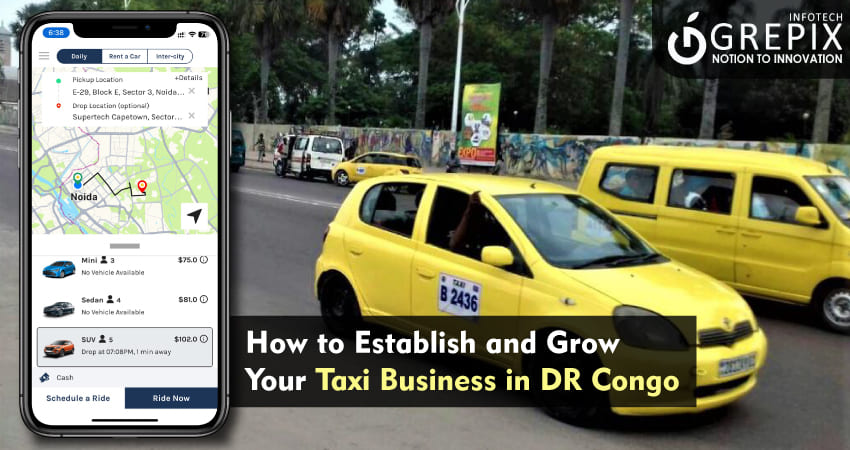How to Establish and Grow Your Taxi Business in DR Congo
The Democratic Republic of Congo (DR Congo) is a rapidly developing nation with immense potential in the transportation sector. As urbanization continues to grow, the demand for reliable and accessible taxi services is increasing. Starting a taxi business in DR Congo can be a profitable venture if approached strategically.
Starting and growing a taxi business in DR Congo requires careful planning, compliance with regulations, and a focus on customer satisfaction. By leveraging technology, building a strong brand, and addressing operational challenges, you can create a successful and sustainable business. With the right approach, you can capitalize on the growing demand for reliable transportation services in DR Congo and achieve long-term success.
This guide provides detailed insights into establishing and growing a successful taxi business in this thriving market.
The Democratic Republic of Congo (DR Congo) presents substantial opportunities for entrepreneurs in the taxi business, fueled by rapid urbanization and a growing demand for reliable transport. To successfully establish a taxi business in DR Congo, it's essential to understand the local market dynamics, comply with regulatory requirements, and focus on customer satisfaction. Entrepreneurs should harness technology to improve service efficiency and engage customers effectively. Strategic planning, such as selecting suitable vehicles, hiring and training competent drivers, and implementing targeted marketing strategies, is crucial. By addressing these key areas, one can build a profitable and sustainable taxi business in DR Congo’s expanding market.
1 Understanding the Market
The first step to building a taxi business is understanding the local market. Research the transportation needs of the population in major cities like Kinshasa, Lubumbashi, and Goma, where urban growth is driving demand for taxi services. Identify your target customers, which may range from daily commuters and tourists to business professionals. Analyze the competition to understand what other taxi operators are offering, their pricing, and the quality of their services. Identifying gaps in the market, such as underserved routes or lack of premium taxi services, can help you carve out a niche.
2 Legal and Regulatory Requirements
Compliance with legal and regulatory standards is essential for running a legitimate taxi business in DR Congo. Start by registering your business with the appropriate authorities. Obtain all necessary permits, including taxi licenses, and ensure your vehicles meet safety regulations. Comprehensive insurance is mandatory to protect both your drivers and passengers. Familiarize yourself with local transportation laws to avoid penalties and ensure smooth operations. Building relationships with local authorities can also help you navigate the regulatory landscape.
3 Creating a Comprehensive Business Plan
A solid business plan serves as the blueprint for your taxi business. Start by defining your goals and objectives, such as the size of your fleet or the areas you plan to serve. Calculate the initial expenses for fuel, insurance, maintenance, and car purchases. Include recurring costs such as marketing campaigns and driver salaries. Set realistic revenue projections and determine your pricing strategy based on market research. Your business plan should also outline growth strategies, such as adding more vehicles or expanding to new locations, as your business matures.
4 Sourcing Vehicles for Your Fleet
The choice of vehicles is critical to the success of your taxi business. Consider fuel-efficient, durable, and spacious vehicles that provide comfort to passengers. Decide whether to purchase new or used cars based on your budget. While new vehicles require a higher initial investment, they tend to have lower maintenance costs. On the other hand, used cars are more affordable upfront but may incur higher repair expenses. Ensure regular vehicle maintenance to reduce downtime and provide a safe, reliable experience for your customers.
5 Financing Your Taxi Business
Securing adequate funding is a significant challenge for many entrepreneurs. Explore various financing options such as bank loans, partnerships with investors, or grants from government and non-governmental organizations. Some financial institutions may offer special loans for small businesses. Maintain a clear budget to manage expenses effectively and prioritize investments that directly contribute to the growth of your business. For example, consider starting with a small fleet and gradually expanding as revenue increases.
6 Hiring and Training Drivers
Drivers are the face of your taxi business, so hiring the right individuals is crucial. Conduct thorough background checks to ensure they have valid licenses, clean driving records, and knowledge of local routes. Provide training that focuses on customer service, defensive driving, and the use of technology, such as GPS navigation and mobile booking apps. To retain drivers, offer competitive salaries, incentives, and a supportive work environment. Happy drivers are more likely to deliver excellent service, enhancing your business reputation.
Also Read: "Accelerating Your Fortune: Becoming a Billionaire in South Africa's Taxi Industry"
7 Leveraging Technology
Technology has revolutionized the taxi industry, making it more efficient and customer-friendly. Equip your business with GPS systems for route optimization and mobile apps for booking and payment. Fleet management software can help you monitor vehicle locations, fuel consumption, and driver performance in real time. Embracing technology not only improves operational efficiency but also enhances the overall customer experience, giving you a competitive edge in the market.
8 Marketing Your Taxi Business
Marketing plays a pivotal role in attracting and retaining customers. Build a strong brand identity with a memorable name, logo, and color scheme. Use social media platforms like Facebook and Instagram to promote your services and engage with customers. Traditional advertising methods, such as radio ads and flyers, can also be effective in reaching local audiences. Partnering with hotels, travel agencies, and corporate offices can help secure long-term contracts and expand your customer base.
9 Delivering Exceptional Customer Service
Customer satisfaction is key to the long-term success of your taxi business. Ensure your vehicles are clean, well-maintained, and equipped with essential amenities. Teach drivers to be professional, courteous, and on time. Establish a feedback mechanism to handle grievances and collect ideas for enhancements. Building a devoted clientele can be facilitated by providing loyalty programs or discounts to returning customers.
10 Overcoming Operational Challenges
Running a taxi business in DR Congo comes with challenges, including high fuel costs, traffic congestion, and poor road infrastructure. Invest in fuel-efficient vehicles and train drivers to navigate efficiently to minimize costs. Regular vehicle maintenance is essential to avoid breakdowns and ensure passenger safety. Safety measures, such as GPS trackers and emergency response systems, can also help address concerns related to driver and passenger security.
11 Scaling Your Business
As your taxi business grows, consider expanding your fleet or exploring new services, such as airport shuttles or luxury transportation. Expanding to new locations can help you tap into underserved markets and increase revenue. Monitor your business performance regularly and adapt your strategies based on customer feedback and market trends. Scaling should be done strategically to maintain service quality and profitability.
12 Embracing Sustainability
Incorporating eco-friendly practices can set your taxi business apart from competitors. Consider adopting hybrid or electric vehicles to reduce carbon emissions and fuel costs. Promote ride-sharing options to decrease the number of vehicles on the road. Engaging in community initiatives, such as supporting local charities or promoting road safety awareness, can also enhance your brand reputation.
Conclusion
Grepix Infotech stands as a pivotal partner for entrepreneurs aiming to tap into the booming taxi market in the Democratic Republic of Congo. With its expertise in developing cutting-edge taxi apps, Grepix Infotech can provide the technological backbone necessary to enhance operational efficiency and customer satisfaction in a complex yet promising environment. By leveraging Grepix Infotech's solutions, taxi businesses can overcome the various challenges posed by the DR Congo's transportation sector, such as navigation difficulties, customer management, and service optimization. Whether it's through advanced booking systems, route management, or client engagement tools, Grepix Infotech enables taxi businesses to not only meet but exceed the evolving expectations of their customers, thereby securing a competitive edge in a rapidly developing market.
FAQs
1. What are the legal requirements for starting a taxi business in DR Congo?
To start a taxi business, you’ll need to register your business, obtain necessary permits, and ensure your vehicles meet local safety standards. Comprehensive insurance for drivers and passengers is also mandatory.
2. How can I finance my taxi business with limited resources?
Explore funding options like bank loans, partnerships with investors, or small business grants. Budget carefully and consider starting with a small fleet to minimize initial costs.
3.What technology tools are essential for a modern taxi business?
Key tools include GPS for navigation, fleet management systems, and mobile apps for bookings and payments. These enhance operational efficiency and improve customer satisfaction.
4. How can I ensure passenger safety in my taxi services?
Install GPS trackers and dash cams, conduct regular driver training, and maintain vehicles to high safety standards. Encourage drivers to follow defensive driving practices.
5. What are the biggest challenges faced by taxi operators in DR Congo?
Common challenges include high fuel and maintenance costs, traffic congestion, and poor road infrastructure. Address these issues through efficient fleet management and route optimization.
Looking out to start your own venture like Uber? Try out our HireMe Taxi Uber Clone, the easiest way to kick-start your taxi business.







